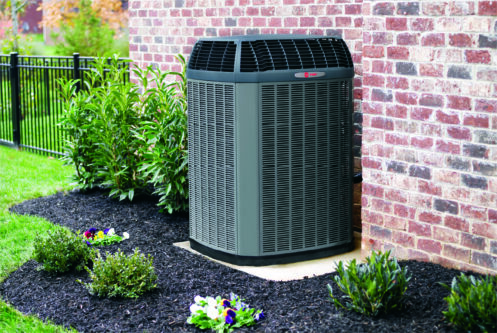
When it’s hot and steamy outside, you probably want to find a way to stay comfortably cool indoors. There are multiple options when it comes to cooling your home; heat pumps and air conditioners are two of the most common, but which is better depends on your needs. Here’s an overview of the differences between a heat pump and AC.
How Air Conditioning Works
An air conditioner is a component of a heating, ventilation, and air conditioning (HVAC) system. Air conditioners pull in air from inside of your home and blow it across coils that are filled with refrigerant. That refrigerant absorbs heat from the air the system takes in, then flows outside to disperse the heat away from your home. Meanwhile, the air that has been cooled is circulated back into your home, bringing the temperature down to keep you comfortable. This process repeats as many times as necessary to get your home to the temperature you set on your thermostat, though your system will take breaks between cycles as part of its normal operation.
How Heat Pumps Work
Heat pumps do the same thing as air conditioners: extract heat from the air they circulate, then push that heat outside to dissipate. What’s unique about heat pumps is that they are also able to heat a building. Essentially, the process works in reverse. For heating, a valve in the outdoor HVAC unit switches to change the direction the refrigerant flows, which makes the refrigerant extract heat from the air outside, then send the heat inside to warm up your home. This works even in cold weather, though some efficiency is lost if the temperatures drop below freezing. Most modern heat pumps have functions built in to mitigate that issue, though, making them still efficient for both heating and cooling even when temperatures drop.
Comparing Heat Pumps and Air Conditioners
Heat pumps and air conditioning each provide their own unique benefits. Which you may prefer depends on various personal factors. There are some key considerations to keep in mind when making your decision.
Cost and Efficiency
Because they can both heat and cool, heat pumps are often a little more expensive up front than air conditioners. However, they are often more efficient than traditional furnaces, which helps the costs even out in the long run, especially if you compare the cost of the heat pump and your long-term energy bills to the cost of an air conditioner, a separate furnace, and their respective energy bills.
Either way, you’ll still need to invest in regular maintenance as well — heat pumps and air conditioning systems should receive yearly (if not bi-yearly) maintenance to keep their warranties intact and keep them working at maximum efficiency.
Ductwork
One thing to keep in mind is that central heating and cooling requires your home to have ductwork; otherwise, the HVAC system doesn’t have a way to circulate the air that’s being heated or cooled. Window AC units and portable AC units don’t require ductwork, but they have a whole host of other considerations that need to be made. If your home doesn’t have ductwork, it may be better to look into ductless heating and cooling systems, known as ductless mini-splits. These systems use individual heat pumps in various areas of your home, allowing for finer temperature control without the need for ducts, though you’ll still see an outdoor unit along with the indoor ones.
Contact Us for Your Cooling Needs
Whether you need advice on heat pumps vs. air conditioners or you’re looking for a new maintenance plan for your HVAC system, we have you covered. From maintenance and installation to commercial work and indoor air quality solutions, MD Air Conditioning & Heating is your stop in San Antonio. Call us today for a consultation!
Tags: AC Installation, Heat Pump Installation
